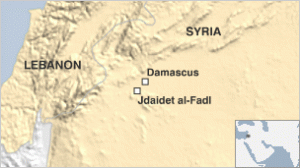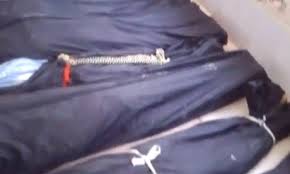 At least 109 people have been documented as killed and up to 400 more are likely to have died in an almost week-long offensive by forces loyal to Syrian President Bashar al-Assad on a rebellious Damascus suburb, opposition activists said.
At least 109 people have been documented as killed and up to 400 more are likely to have died in an almost week-long offensive by forces loyal to Syrian President Bashar al-Assad on a rebellious Damascus suburb, opposition activists said.
If the accounts are confirmed, the killings in the mainly Sunni Muslim suburb of Jdeidet al-Fadel would amount to one of bloodiest episodes of the two-year-old uprising against Assad. Many of the dead were civilians, the activists said.
A statement by the Syrian National Coalition umbrella opposition group, issued from Istanbul, said death toll “continues to rise and has reached the hundreds” and described the killings as a “horrifying civilian massacre”.
“The deafening silence of the international community over these crimes against humanity is shameful, and has become routine for the victims and their families,” the statement said.
“Syrians no longer expect an answer to our pleas for help or a chivalrous intervention from our brothers and neighbors. We no longer expect to be supported with the necessary arms to empower the Free Syrian Army to defend our people.”
Syrian state media gave no death toll but confirmed the army had been fighting in Jdeidet al-Fadel. It said it had saved the town from what it described as criminal terrorist groups, killing and wounding an undisclosed number of them.
On Sunday, activists said at least 85 people had been killed and the toll might reach 250, but with the army beginning to pull back they said more accounts were emerging which suggest the final figure could be even higher.
The activists, speaking from the area, 10 km (six miles) southwest of Damascus, said residents had buried some victims in the early stages of the five-day attack by elite forces and pro-Assad militias. More bodies were now being found burnt or apparently killed in summary executions, they said.
Rebel brigades who numbered around 300 fighters withdrew two days ago, they said, leaving Assad’s forces in total control.
The working-class district is one of several Sunni Muslim towns surrounding the capital that have been at the forefront of the uprising. It is situated near hilltop bases of elite forces which are mostly from Assad’s minority Alawite sect, an offshoot of Shi’ite Islam that has dominated Syriasince the 1960s.
BODIES LYING IN STREETS
 Shamel al-Golani, of the opposition Sham News Network, said one of the hardest hit areas was a neighborhood adjacent to the 100 army brigade, one of several elite units based around Jdeidet al-Fadel.
Shamel al-Golani, of the opposition Sham News Network, said one of the hardest hit areas was a neighborhood adjacent to the 100 army brigade, one of several elite units based around Jdeidet al-Fadel.
“In the first three days the army would go into neighborhoods and commit killings and withdraw and come back the next day,” he said.
“Many of them who were killed early were refugees from Daraya and al-Mouadamiya and were buried quietly,” he said, referring to two adjacent suburbs that have been the scene of fighting and several army incursions.
Assad’s forces have been accused of massacring hundreds of Sunni Muslims in areas they stormed in Hama and Homs provinces and Damascus suburbs. International rights groups say rebel forces have also committed atrocities, although on a smaller scale.
Jdeidet al-Fadel lies on the road from Damascus to the Israeli-occupied Golan Heights. Its residents are Golan refugees and in the last year thousands of families from nearby areas took shelter in the town.
The Syrian Organisation for Human Rights (Sawasiah), which put the death toll at 500, said the army forces included elite Republican Guards, the 100 and 153 artillery brigades and the 555 brigade, formerly known as the Defense Brigades.
Units of “sectarian militia” supported by members of air force intelligence, one of the most feared of a myriad of secret police branches, accompanied the army units, it said.
According to witness accounts interviewed by the Syrian organisation, water and electricity were cut off from the town and residents were not allowed to leave as Assad’s forces blocked ways in and out of the suburbs.
Many of the victims, Sawasiah said, were civilians, targeted because the suburb was an “incubator for armed resistance” and they had showed solidarity with refugees in adjacent towns also subjected to mass killings.
Reuters

Leave a Reply
You must be logged in to post a comment.